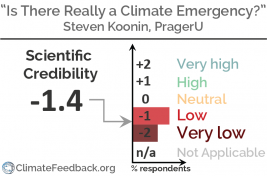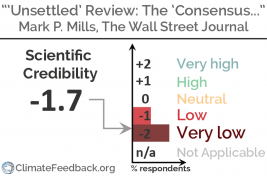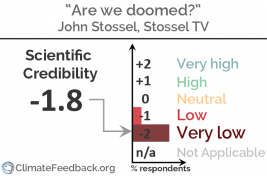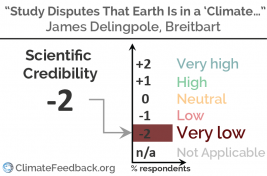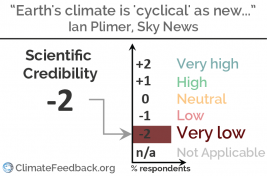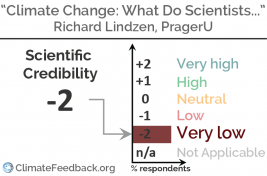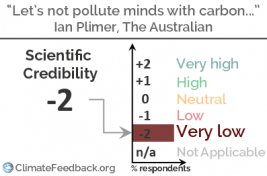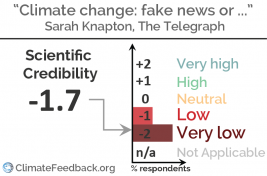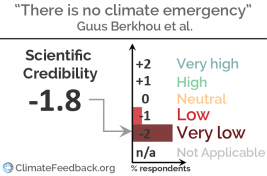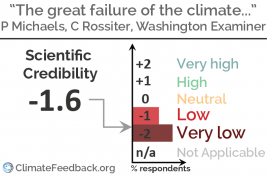.
Articles tagged as: Inaccurate definition
PragerU video on climate change repeats a range of misleading claims by Steven Koonin
in PragerU, by Steve Koonin
“The author of this video, Dr. Steven Koonin, says he is following the scientific reports published by the UN and US government, but by subtly changing wording and choosing not to mention important context this video is very likely to mislead readers.
This style of selective wording and lack of context, an approach called “cherry picking”, applies to every one of Dr. Koonin’s scientific comments.”
— 29 Nov 2021
Wall Street Journal article repeats multiple incorrect and misleading claims made in Steven Koonin’s new book ’Unsettled’
in The Wall Street Journal, by Mark P. Mills
Scientists who reviewed the article found that it builds on a collection of misleading and false claims. For instance, Koonin states that “Greenland’s ice sheet isn’t shrinking any more rapidly today than it was eighty years ago”. Contrary to the claim, scientific studies using airborne and satellite altimetry observations show considerable thinning has occurred along the margin of the Greenland ice sheet since 2003.
— 03 May 2021
Video promoted by John Stossel for Earth Day relies on incorrect and misleading claims about climate change
in Stossel TV, by John Stossel, Patrick Michaels, David Legates
“This video is misleading in so many ways it’s hard to know where to begin. For a start there’s a repeated assertion that climate “alarmists” won’t enter debate on climate change, but there are many examples of renowned climate scientists such as Gavin Schmidt, Michael Mann and David Karoly entering into debates with climate change denialists. Many scientists have found such debates to be unhelpful as they give the false impression of balance despite there being broad consensus among climate scientists…”
— 21 Apr 2021
Breitbart article makes numerous false claims about the impacts of climate change, based on Global Warming Policy Foundation post
in Breitbart, by James Delingpole, Dr. Indur Goklany
“The article’s scientific credibility is very low. The author cherry-picks data, makes broad generalizations and characterizations based on incomplete or flimsy reasoning, and repeatedly misinterprets technological and economic progress in justifying false claims and misinformation minimizing global warming impacts.”
— 12 Feb 2021
Video interview of Ian Plimer at Sky News falsely claims that a new study announces an incoming ice age, partly based on an incorrect Daily Mail headline
in Sky News, by Ian Plimer
“This video is chock full of false and misleading information, and presented in a way to make the correct scientific information seem like a farce. For example, the direct link between human emissions of carbon dioxide and global warming is very well established. The physics and chemistry of this link has been understood for well over 100 years, and science continues to affirm it.”
— 20 Jan 2021
Video from PragerU makes several incorrect and misleading claims about climate change
in PragerU, by Richard Lindzen
This video discussing climate change was first published on PragerU’s website in April 2016 and recently posted on Facebook in May 2020. Scientists that evaluated the video found several claims about climate change to be incorrect and misleading to viewers.
— 23 May 2020
Ian Plimer op-ed in The Australian again presents long list of false claims about climate
in The Australian, by Ian Plimer
“This article is a mixture of misdirection, misleading claims, and outright falsehoods. The author attempts to paint a picture of current climate change as simply a continuation of natural changes that have occurred in the past. But this neglects the clear evidence that climate change over the last two centuries has been shown to be largely man-made, that it is much more rapid that anything we have seen in the last two thousand years if not longer, and that it is occurring in the context of a globe with more than 7 billion human inhabitants.”
— 26 Nov 2019
Telegraph article on climate change mixes accurate and unsupported, inaccurate claims, misleads with false balance
in The Telegraph, by Sarah Knapton
“This article is a prime example of false equivalence, putting fringe figures side by side with mainstream scientific findings while failing to distinguish between their respective credibility. It is rife with numerous factual errors and misrepresentations. Anyone unfortunate enough to read it will understand less of the science – as actually appears in peer-reviewed publications and conferences – not more.”
— 18 Oct 2019
Letter signed by “500 scientists” relies on inaccurate claims about climate science
in clintel.nl, by Guus Berkhout, Reynald du Berger, Terry Dunleavy, Viv Forbes, Jeffrey Fos, Morten Jodal, Rob Lemeire, Richard Lindzen, Ingemar Nordin, Jim O'Brien, Alberto Prestininzi, Benoit Rittaud, Fritz Vahrenholt, Christopher Monckton
“The scientific content is completely inaccurate, undocumented, and fails to bring proof for its claims. The ending of the Little Ice Age in 1850 has no logical link with the fact that the Earth is warming now. Most past climate variations have been slower or less intense as the present one, and if they were as fast or severe they brought about mass extinctions in the biosphere. No explanation or proof is brought on the implausibility or inaccuracy of climate models (whose accuracy or uncertainty is precisely quantified and makes their use better than just random guesses).”
— 04 Oct 2019
Washington Examiner op-ed cherry-picks data and misleads readers about climate models
in The Washington Examiner, by Patrick Michaels, Caleb Stewart Rossiter
“This article focuses only on specific lines of evidence that climate models disagree with observations. In doing so, the authors ignore research that helps to reconcile differences between models and observations. The authors do not consider alternate datasets and time periods in which models and observations agree. Models are one tool for understanding climate change; their overall credibility does not hinge on one variable, in one domain, over a specific time period, with respect to a set of imperfect observations.”
— 31 Aug 2019

